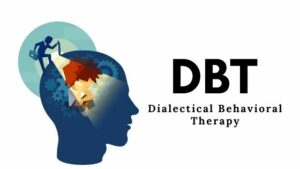It is said that time heals all wounds, but when it comes to matters of the heart, time is not always enough. The painful aftermath of a breakup can sometimes leave us feeling lost, hollow, and disconnected from ourselves and the world. This blog post is intended to guide you through the process of therapy to get over someone. And practices to transform your pain into personal growth and renewed strength.
Contents
- 1 Can A Therapist Help You Get Over Someone?
- 2 Top 10 Therapy To Get Over Someone
- 2.1 Cognitive-Behavioral Therapy (CBT)
- 2.2 Acceptance and Commitment Therapy (ACT)
- 2.3 Mindfulness-Based Cognitive Therapy (MBCT)
- 2.4 Dialectical Behavioral Therapy (DBT)
- 2.5 Narrative Therapy
- 2.6 Interpersonal Therapy (IPT)
- 2.7 Eye Movement Desensitization and Reprocessing (EMDR)
- 2.8 Gestalt Therapy
- 2.9 Art Therapy
- 2.10 Psychodynamic Therapy
- 3 Benefits Of Choosing Therapy To Get Over Someone
- 4 Conclusion
Can A Therapist Help You Get Over Someone?
 Yes, a therapist can indeed provide significant support when you’re trying to move on from a relationship. They can help you navigate through the complexities of your emotions, explore patterns in your relationships, and work through unresolved feelings. Therapy provides a safe and confidential environment where you can express your thoughts and feelings without judgment. This process can lead to valuable insights about your needs, desires, and behaviors. Ultimately, empowering you to move forward.
Yes, a therapist can indeed provide significant support when you’re trying to move on from a relationship. They can help you navigate through the complexities of your emotions, explore patterns in your relationships, and work through unresolved feelings. Therapy provides a safe and confidential environment where you can express your thoughts and feelings without judgment. This process can lead to valuable insights about your needs, desires, and behaviors. Ultimately, empowering you to move forward.
Furthermore, therapists can equip you with effective coping strategies to manage the pain and anxiety associated with the breakup. They can help you build resilience, improve your self-esteem, and foster a positive mindset. Therapy can also aid in developing healthier relationship patterns for the future. In essence, while the journey may be challenging, a therapist can guide you toward healing and personal growth, ultimately aiding in your journey to move on.
Top 10 Therapy To Get Over Someone
Here are ten therapeutic approaches that can be effective in helping you move on after a breakup:
Cognitive-Behavioral Therapy (CBT)
CBT is based on the concept that our thoughts, feelings, and behaviors are interconnected. Negative thought patterns can cause emotional distress and unhelpful behaviors. In the context of a breakup, you may find yourself caught in a loop of negative self-talk or ruminating over past events, leading to feelings of sadness, anxiety, or anger. A CBT therapist would work with you to identify these patterns and develop strategies to challenge and change them. For instance, you might learn to replace thoughts like “I’ll never find love again” with more positive and realistic ones, such as “It will take time to heal, but I am capable of finding love again.”
Acceptance and Commitment Therapy (ACT)
The core message of ACT is to accept what is out of your personal control and commit to actions that enrich your life. Instead of fighting your feelings of heartbreak, ACT encourages you to acknowledge and accept these emotions as part of the human experience. This doesn’t mean resignation, but rather understanding that these feelings are temporary. ACT also helps you identify your values and take steps that align with them, which can give you a sense of direction and purpose after a breakup.
Mindfulness-Based Cognitive Therapy (MBCT)
MBCT combines cognitive therapy techniques with mindfulness strategies. The mindfulness aspect encourages you to pay attention to the present moment without judgment. After a breakup, it’s common to dwell on past memories or worry about the future. By training your mind to focus on the present, MBCT can help reduce these distressing thoughts. And allow you to better cope with your current feelings.
Dialectical Behavioral Therapy (DBT)
 Originally developed to treat borderline personality disorder, DBT has proven effective for a range of issues. That includes difficulty managing emotions and relationship problems. DBT teaches coping skills for stress tolerance, emotional regulation, and interpersonal effectiveness. For someone going through a breakup, these skills can be extremely helpful. For example, emotional regulation strategies could help you manage intense feelings of sadness or anger. While interpersonal effectiveness skills can assist in setting healthy boundaries when dealing with your ex-partner.
Originally developed to treat borderline personality disorder, DBT has proven effective for a range of issues. That includes difficulty managing emotions and relationship problems. DBT teaches coping skills for stress tolerance, emotional regulation, and interpersonal effectiveness. For someone going through a breakup, these skills can be extremely helpful. For example, emotional regulation strategies could help you manage intense feelings of sadness or anger. While interpersonal effectiveness skills can assist in setting healthy boundaries when dealing with your ex-partner.
Narrative Therapy
This approach views you as the expert in your own life and sees the therapist as a collaborator helping you explore your life story. In narrative therapy, you’re encouraged to see your life as a narrative, or series of stories, and your role as the narrator. After a breakup, you may feel stuck in a story of rejection or heartbreak. A narrative therapist would help you explore these narratives, understand how they’re affecting you, and assist in creating a new one. Further, more empowering story where you are resilient and capable of moving forward.
Interpersonal Therapy (IPT)
This therapy focuses on interpersonal relations and social roles to help improve current mood and functioning. It emphasizes a person’s interactions with others and how these interactions can be a source of emotional distress. After a breakup, IPT can help you understand the role the relationship played in your life and guide you in forming healthy relationships in the future. It can help you learn how to express your emotions effectively, improve your communication skills, and build a solid social support network.
Eye Movement Desensitization and Reprocessing (EMDR)
Initially developed to treat traumatic memories, EMDR has been used effectively to help people process a range of emotional distress. During EMDR therapy, you are guided to recall distressing images while the therapist directs you to make certain eye movements. Simultaneously, EMDR therapy will work with you to reframe negative thoughts into positive ones. For a painful breakup, EMDR can help in reducing the intensity of the emotional pain and foster healthier responses toward memories. That is associated with the person you’re trying to get over.
Gestalt Therapy
This form of therapy focuses on gaining awareness of the present moment in a non-judgmental way. In Gestalt therapy, you would work on understanding and accepting your feelings about the breakup, rather than trying to change them. The therapy encourages you to take responsibility for your emotional reactions and understand the impact of your behavior on others. It can provide you with a deeper self-awareness, helping you realize that you have the power to control your reactions and cope with the pain of heartbreak.
Art Therapy
Art therapy uses the process of creating art to help explore feelings, reconcile emotional conflicts, and foster self-awareness. After a breakup, you might struggle to express your feelings verbally. In art therapy, creating art provides a different mode of expression. You can explore your emotions about the end of the relationship through your art, allowing you to express your feelings in a safe and creative way, and helping you understand and heal from the breakup.
Psychodynamic Therapy
This therapy is based on the premise that unconscious processes influence our behavior. It works to uncover these unconscious thoughts and feelings, helping you to understand how they have influenced your past relationships. In the context of a breakup, a psychodynamic therapist would work with you to explore past experiences and patterns in relationships. This understanding can help you identify why the relationship ended and how you can establish healthier relationship patterns in the future.
Benefits Of Choosing Therapy To Get Over Someone
 Choosing therapy to help get over someone can offer a wide array of benefits. Here are some of them:
Choosing therapy to help get over someone can offer a wide array of benefits. Here are some of them:
- Improved Emotional Understanding: Therapy can help you better understand and process your emotions. It’s natural to experience a range of feelings after a breakup, and a therapist can guide you through acknowledging and accepting these emotions without judgment.
- Healthy Coping Strategies: Therapists can equip you with effective strategies to manage the distress associated with heartbreak. These skills can also be beneficial in managing other stressors in your life, leading to better overall mental health.
- Increased Self-awareness: Therapy often leads to greater self-awareness. Through therapy, you can gain insights into your behaviors, thoughts, and feelings, understand your needs and desires better, and learn more about your patterns in relationships.
- Enhanced Self-esteem: Working with a therapist can help you rebuild your self-esteem after a breakup. You can rediscover your worth as an individual beyond the relationship and develop a stronger sense of self-confidence.
- Improved Future Relationships: Therapy can help you identify any unhealthy patterns that might have contributed to the end of your relationship. Understanding these patterns can allow you to establish healthier relationships in the future.
- Closure: Sometimes, relationships end without closure. In therapy, you can explore your feelings about the relationship, work towards accepting its end, and find your own sense of closure.
- Support: A therapist provides a safe, non-judgmental space for you to express your thoughts and feelings. This support can be especially beneficial if you’re feeling isolated or misunderstood in your pain.
- Personal Growth: Ultimately, therapy can lead to significant personal growth. It can help you transform painful experiences into opportunities for self-understanding, resilience, and growth.
Conclusion
In conclusion, choosing therapy to get over someone can be an empowering decision. It equips you with the necessary tools to understand and express your emotions healthily, cultivate better coping strategies, and build increased self-awareness and self-esteem. Not only does it support you in healing from the pain of a breakup, but it also lays the foundation for healthier relationships in the future.
The support of a therapist offers a safe, empathetic space for this exploration and growth. Breaking up can be one of the most challenging experiences in life.If you have any queries regarding Online Breakup Counseling experienced therapists at CoupleMantra can help: Book a trial couple therapy session


